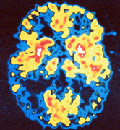
Soon Alzheimer's disease could be detected by a blood test, say researchers at Emory University.
"Reliability and failure to replicate initial results have been the biggest challenge in this field. We demonstrate here that it is possible to show consistent findings," William Hu, assistant professor of neurology at Emory University School of Medicine and lead of the study has been quoted as saying.
Hu and his associates at the University of Pennsylvania and Washington University, St. Louis, measured the levels of 190 proteins in the blood of 600 study participants at those institutions, says a report published in the journal Neurology.
The researchers included healthy volunteers and those who had been diagnosed with Alzheimer's disease or mild cognitive impairment (MCI). MCI, which foreshadows Alzheimer's, causes a slight but measurable decline in cognitive abilities, an Emory statement says.
Presently the Neurologists diagnose Alzheimer's through its symptoms. Additional information can be attained from PET brain imaging that is an expensive proposition, or analysis of a spinal tap, which can be painful.
"Though a blood test to identify underlying Alzheimer's disease is not quite ready for prime time given today's technology, we now have identified ways to make sure that a test will be reliable," Hu has been quoted as saying.
"In the meantime, the combination of a clinical exam and cerebrospinal (brain) fluid analysis remains the best tool for diagnosis in someone with mild memory or cognitive troubles," Hu explained.
--with inputs from IANS
|
|


Comments: